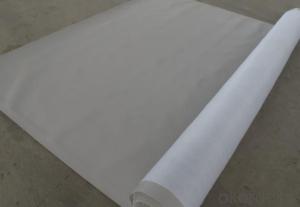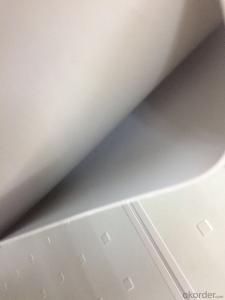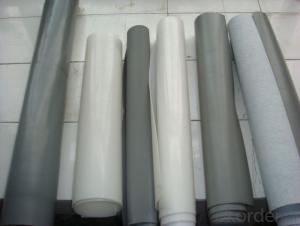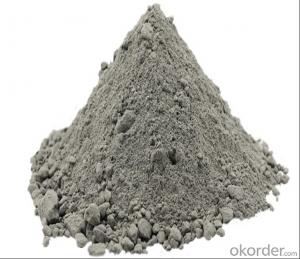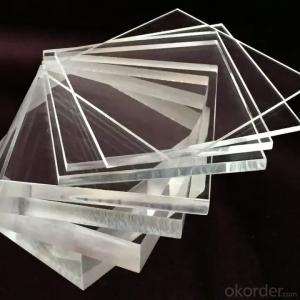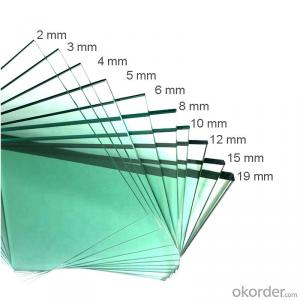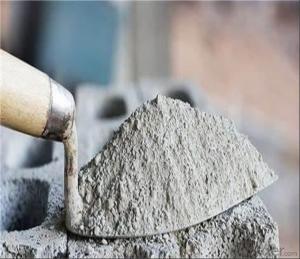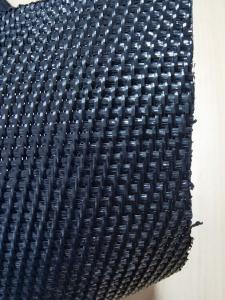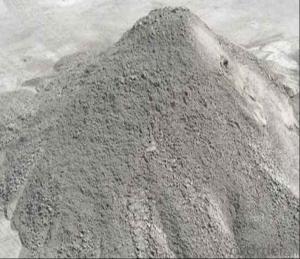PVC Waterproofing Membrane 1.2 mm from Manufactory
- Loading Port:
- Tianjin
- Payment Terms:
- TT OR LC
- Min Order Qty:
- 5000 m²
- Supply Capability:
- 100000 m²/month
OKorder Service Pledge
OKorder Financial Service
You Might Also Like
PVC waterproofing membrane
Polyvinyl Chloride (PVC) waterproof membrane is a new polymer waterproof membrane which is made from polyvinyl chloride resin, and mixed with plasticizer, filler, antioxygen, ultraviolet absorber and other auxiliaries.
Product Applications:
1. All kinds of roofs, such as steel structure roof, planted roof etc.
2. Underground engineering, such as basement, subways, tunnels, air raid shelter, etc.
3. Other projects like artificial lake, dam, water reservoir, grain storehouse, etc.
Product Features:
1. Excellent aging resistance.
2. Root resistant penetration, specially used on planting roof.
3. Welding installation. Joints are solid and environment friendly, no pollution.
4. High tensile strength, good elongation and dimensional stability.
5. Good plasticity, easy and suitable for details installation.
6. Fireproof. Fire extinguished out of the ignition resource.
Product Specifications:
1. Size: 2.05(width)*20m (length), as clients' request
2. Thickness: 1.2mm; 1.5mm; 2.0mm, etc
3. Type: Homogeneous, Reinforced, Fabric back
4. Exposed and Non-exposed
5. Color: white, Grey or customized
FAQ:
Q: Can I get samples?
A: Yes, we could arrange samples for free.
Q: Can I do the third party testing before loading?
A: Yes, we could accept the third party testing.
Q: Which kind of payment in your company?
A: We could accept TT, LC at sight, etc.
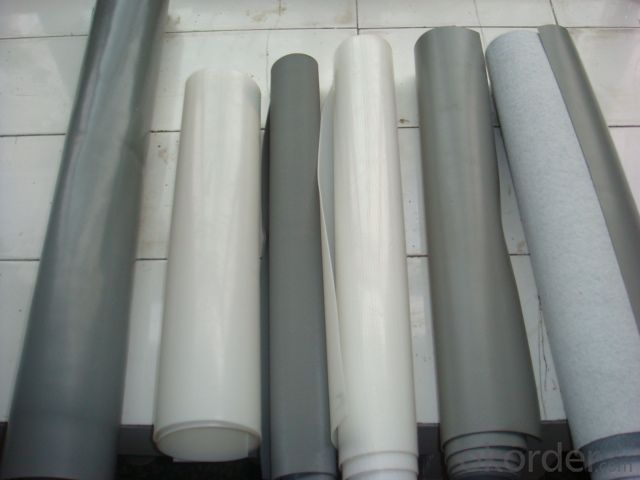
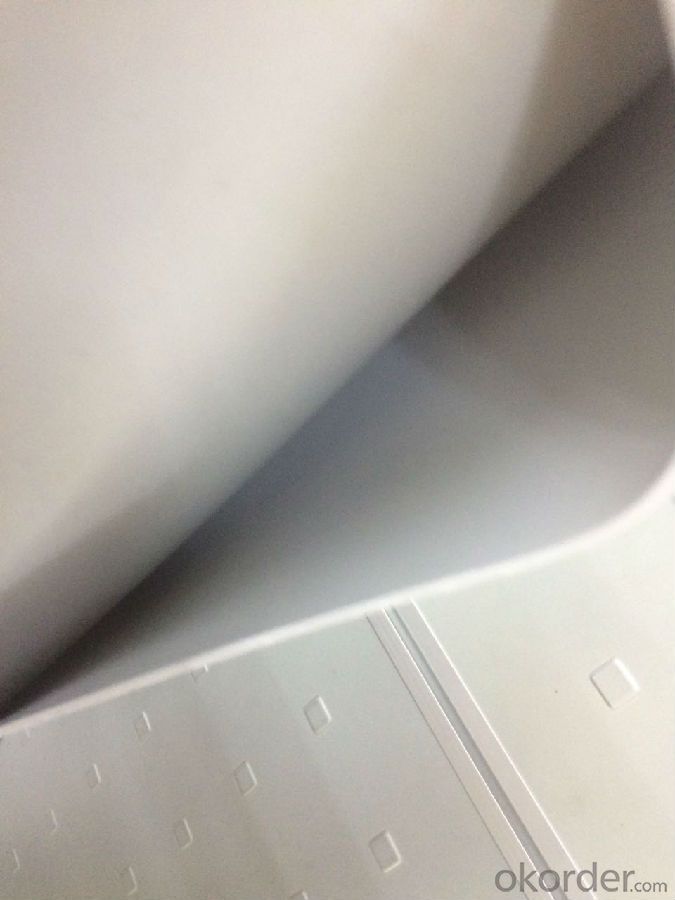
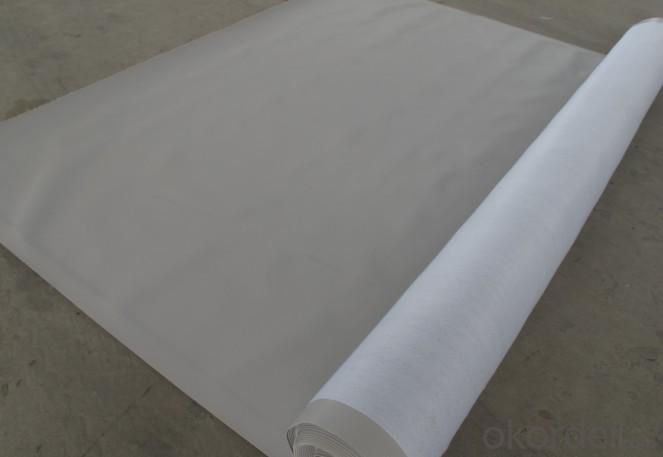
- Q:Can a waterproofing membrane be used on tunnels with railway systems?
- Yes, a waterproofing membrane can be used on tunnels with railway systems. The membrane helps to prevent water ingress and moisture damage to the tunnel structure, ensuring the safety and longevity of the railway system.
- Q:What is the best waterproofing membrane for my project?
- The choice of the best waterproofing membrane for your project will depend on various factors, such as the project type, specific requirements, and budget. There are multiple options available in the market, each offering unique features and advantages. One favored option is the bituminous waterproofing membrane, which is cost-effective and suitable for a wide range of projects like roofs, basements, and foundations. These membranes are durable, flexible, and can withstand extreme weather conditions. They can be applied using methods like torch-on, self-adhesive, or hot-melt. Another alternative to consider is the polyurethane liquid membrane, which provides exceptional elasticity and is ideal for areas requiring flexibility, such as balconies, terraces, and swimming pools. These membranes are resistant to UV rays and can be easily applied using a brush or roller. For projects that demand high durability and resistance, the cementitious waterproofing membrane might be the optimal choice. This type of membrane is a mixture of cement, sand, and special additives that create a thick and protective layer. It is commonly used for underground structures, tunnels, and water tanks. If your project involves below-grade applications or areas with high water pressure, the bentonite waterproofing membrane could be the most suitable option. Bentonite membranes, made of clay minerals, swell when exposed to water, forming a watertight barrier. They are commonly used in basements, foundations, and retaining walls. Ultimately, determining the best waterproofing membrane for your project will depend on your specific requirements, budget, and preferences. It is advisable to consult with a professional waterproofing contractor who can assess your project's needs and recommend the most suitable membrane system.
- Q:Can a waterproofing membrane be used for a garden pond?
- Yes, a waterproofing membrane can be used for a garden pond. Waterproofing membranes are designed to create a barrier against water leakage, making them suitable for lining and sealing garden ponds to prevent water from seeping into the surrounding soil.
- Q:Can a waterproofing membrane be used for a hospital?
- Yes, a waterproofing membrane can be used for a hospital. Waterproofing membranes are commonly used in construction projects to prevent moisture infiltration and protect the integrity of the building materials. In a hospital setting, where hygiene and infection control are of utmost importance, it is crucial to maintain a dry and clean environment to prevent the growth of mold, mildew, and bacteria. A waterproofing membrane can help to create a barrier against water and moisture, preventing any potential damage to the structure and ensuring a safe and healthy environment for patients, staff, and visitors. Additionally, waterproofing membranes can also be used in specific areas of a hospital, such as operating rooms or laboratories, where the risk of spills or water exposure is higher. Overall, the use of a waterproofing membrane in a hospital can contribute to maintaining a high standard of cleanliness, safety, and durability in the facility.
- Q:Can a waterproofing membrane be used for balconies or decks?
- Balconies or decks can indeed benefit from the use of waterproofing membranes. These specialized membranes are designed to safeguard surfaces against water damage, making them an excellent option for outdoor areas that are continuously exposed to the elements. Typically crafted from durable materials like rubber or PVC, these membranes are applied directly onto the balcony or deck surface. They form a protective barrier that prevents water from permeating the underlying structure, thus prolonging the lifespan of the balcony or deck and preventing issues such as rot or mold. Moreover, waterproofing membranes offer additional safeguards against UV rays, chemicals, and foot traffic, making them a dependable choice for enhancing the resilience and longevity of balconies and decks.
- Q:Can a waterproofing membrane be used for a warehouse floor?
- Indeed, one can utilize a waterproofing membrane for a warehouse floor. Its primary purpose is to thwart the infiltration of water and various liquids, thus establishing a safeguarding barrier. This proves particularly advantageous in a warehouse environment where spills and leaks are commonplace. The application of a waterproofing membrane to the floor aids in averting water damage, inhibiting the growth of mold, and mitigating other potential complications. Furthermore, it endows the warehouse floor with enhanced durability and strength, thereby prolonging its lifespan and diminishing the necessity for repairs or replacement. All in all, employing a waterproofing membrane on a warehouse floor represents a cost-effective and efficient approach to preserving the space and ensuring its longevity.
- Q:What is rigid waterproof, flexible waterproof?
- 1, rigid waterproof means that: waterproof layer by the tensile force is greater than the tensile strength of waterproof materials (including settlement deformation, temperature deformation, etc.), waterproof layer of brittle cracking caused by leakage of water, known as rigid waterproof. (Especially the "water leakage" waterproof layer), waterproof concrete mortar waterproof layer, thin layer of inorganic rigid waterproof layer (such as "water leakage" waterproof layer), and so on.
- Q:Can a waterproofing membrane be used in areas with heavy foot traffic?
- Areas with heavy foot traffic can indeed utilize a waterproofing membrane. Many waterproofing membranes are explicitly engineered to endure extensive usage and mistreatment, thereby making them ideal for heavily frequented spaces like walkways, balconies, and parking decks. These membranes are typically constructed from robust materials such as rubber, PVC, or modified bitumen, which display resistance against wear and tear. In addition, certain membranes possess a surface that prevents slipping, thereby enhancing safety in walking zones. To guarantee enduring protection in areas with heavy foot traffic, it is crucial to carefully select a waterproofing membrane that suits the specific application and fulfills the necessary durability standards.
- Q:Are there any specific considerations for installing a waterproofing membrane on concrete surfaces?
- Installing a waterproofing membrane on concrete surfaces requires careful attention to several specific considerations. Firstly, it is crucial to thoroughly clean the concrete surface and remove any loose materials, oil, grease, or contaminants that could hinder the adhesion of the membrane. Failure to do so may compromise the effectiveness of the waterproofing. Secondly, it is of utmost importance to inspect the concrete surface for cracks, spalling, or other types of damage. Prior to installing the waterproofing membrane, these defects must be repaired to prevent water from penetrating through the membrane and compromising its ability to protect the concrete. Moreover, the selection of the appropriate type of waterproofing membrane is essential. There are various options available, such as sheet membranes, liquid-applied membranes, and cementitious coatings. Each type has different application methods, durability, flexibility, and resistance to substances. Therefore, it is crucial to choose the membrane that best suits the specific concrete surface and its intended use. In addition, the installation process should strictly adhere to the manufacturer's instructions. This includes applying the membrane at the recommended thickness, ensuring proper overlap and adhesion of the seams, and using any recommended primers or adhesives. Lastly, long-term maintenance and durability should be taken into consideration. Regular inspections, maintenance, and repairs are necessary to ensure the membrane remains intact and effective in preventing water penetration.
- Q:Can a waterproofing membrane be used on brass surfaces?
- A waterproofing membrane is typically used to protect surfaces from water penetration and damage. While brass surfaces are not typically prone to water damage, a waterproofing membrane can still be used as an additional protective layer. It can help prevent moisture build-up on the brass surface, which can eventually lead to tarnishing or corrosion. However, it is important to note that brass surfaces are often desired for their natural patina and aesthetic appeal. Applying a waterproofing membrane may alter the appearance of the brass, potentially creating a glossy or artificial finish. Therefore, it is advisable to carefully consider the desired outcome before deciding to use a waterproofing membrane on brass surfaces.
1. Manufacturer Overview |
|
|---|---|
| Location | |
| Year Established | |
| Annual Output Value | |
| Main Markets | |
| Company Certifications | |
2. Manufacturer Certificates |
|
|---|---|
| a) Certification Name | |
| Range | |
| Reference | |
| Validity Period | |
3. Manufacturer Capability |
|
|---|---|
| a)Trade Capacity | |
| Nearest Port | |
| Export Percentage | |
| No.of Employees in Trade Department | |
| Language Spoken: | |
| b)Factory Information | |
| Factory Size: | |
| No. of Production Lines | |
| Contract Manufacturing | |
| Product Price Range | |
Send your message to us
PVC Waterproofing Membrane 1.2 mm from Manufactory
- Loading Port:
- Tianjin
- Payment Terms:
- TT OR LC
- Min Order Qty:
- 5000 m²
- Supply Capability:
- 100000 m²/month
OKorder Service Pledge
OKorder Financial Service
Similar products
New products
Hot products
Related keywords
